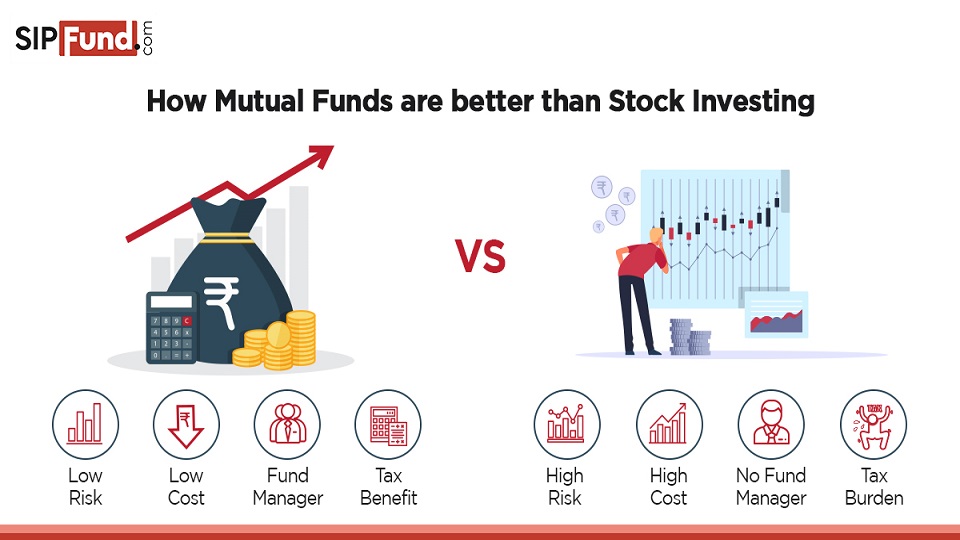So, you’ve finally decided to invest your money — great move! But the moment you start… BOOM 💥 — you’re hit with two big options: Stocks or Mutual Funds.
Confused about which one to choose? You’re not alone.
In this guide, we’ll break down stocks vs mutual funds in the most simple, no-jargon way — so you can start investing confidently and smartly.
🧠 First Things First: Why Even Invest?
If you leave your money in a savings account, it earns 2–4% interest (and inflation eats most of that).
Investing lets your money grow over time — so you can build wealth, beat inflation, and reach goals like travel, buying a house, or early retirement.
🏦 What Are Stocks?
When you buy a stock, you’re buying a small piece of a company — like TCS, Apple, or Reliance.
- If the company does well → stock price goes up → you profit
- If it fails → stock price drops → you lose money
✅ Pros:
- Higher returns possible
- You have full control
- Learn more about the market
❌ Cons:
- High risk (prices fluctuate daily)
- Requires time, research, and knowledge
- One bad stock = your money can tank
🤝 What Are Mutual Funds?
A mutual fund pools money from many investors and is managed by an expert (fund manager).
They invest that money into a mix of:
- Stocks
- Bonds
- Gold
- Other assets
You get diversified exposure with just one fund.
✅ Pros:
- Beginner-friendly
- Lower risk (diversified portfolio)
- Professionally managed
- Start with as little as ₹100 (via SIP)
❌ Cons:
- Returns are slower than direct stocks
- You pay small fees (called “expense ratio”)
- Less control over exact investments
📊 Quick Comparison Table
| Feature | Stocks | Mutual Funds |
|---|---|---|
| Risk | High | Medium to Low (depends on fund) |
| Returns Potential | Very High (and very low too) | Moderate and stable |
| Control | Full (you pick) | None (fund manager decides) |
| Ideal For | Active learners, risk-takers | Beginners, busy people |
| Start Amount | ₹100 – ₹500 | ₹100 (SIP) |
| Time Needed | High (research required) | Low (set and forget) |
| Tax Benefits | Depends | ELSS Mutual Funds give benefits |
🧪 Real Life Example:
Let’s say you have ₹5,000 to invest.
Option 1: Stocks
You buy shares of Tata Motors. If the stock goes up 10%, you make ₹500.
But if it drops 10%, you lose ₹500. High risk, high reward.
Option 2: Mutual Fund (SIP)
You invest ₹1,000 every month in a good Equity Mutual Fund. It grows steadily over years. Less risk, more consistency.
🧠 Which One Should You Choose?
✔️ Go with Stocks if:
- You enjoy reading about companies, markets, trends
- You can spend time tracking your portfolio
- You’re okay with short-term ups and downs
✔️ Go with Mutual Funds if:
- You’re just starting out
- You want less risk and more stability
- You don’t have time to research stocks
- You prefer “set it and forget it” investing
🛠️ How to Get Started (Step-by-Step)
For Stocks:
- Open a Demat account (Zerodha, Groww, Upstox, etc.)
- Add funds
- Start small — research good companies
- Invest and track regularly
For Mutual Funds:
- Download Groww, Zerodha Coin, Paytm Money, etc.
- Pick a good SIP in a fund like:
- Axis Bluechip Fund
- HDFC Flexi Cap
- Mirae Asset Emerging Bluechip
- Set auto-debit every month
- Let it grow passively
💡 Final Advice
- Don’t rush. Start small and learn as you go.
- Avoid “hot tips” or following hype blindly
- Invest consistently — not just when markets are rising
- Reinvest your returns for compounding magic
“The best time to invest was yesterday. The next best time is today.” 🚀
Need help choosing your first SIP or stock? Just say “guide me bro” and I’ll give you personalized beginner picks. 💸📲


